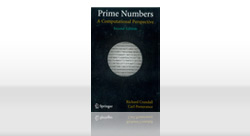Get started with Wolfram technologies, or work with us to apply computational expertise to your projects.
Questions? Comments? Get in touch: 1-800-WOLFRAM, or email us

Professor Richard E. Crandall is a renowned computational scientist, author, and long-time Mathematica user who specializes in developing algorithms for interdisciplinary use. He is an Apple Distinguished Scientist and also serves as Director of the Center for Advanced Computation and Telecommunications in Portland, Oregon, where he continues his interdisciplinary research and Apple contributions.
Crandall has been a Mathematica user for more than a decade. He used Mathematica prototyping in the late 1980s to develop the IBDWT (irrational base discrete weighted transform) algorithm that is now in wide use in large-prime searches. In fact, the four most recent, largest known primes (the latest being 2^13466917 - 1) were all found with his IBDWT algorithm.
With a doctorate from MIT, Crandall has worked at length in both the commercial and the academic realms and has received a number of national awards and distinguished appointments. In all, he has authored over 60 papers, several textbooks, and eight U.S. patents. Among his many papers are yet other examples of Mathematica successes. His work on space-filling curves grew almost exclusively out of Mathematica manipulations. His papers on lattice sums--notably the Madelung constant--also made heavy use of Mathematica during the research phases. His work on the quantum zeta function necessitated powerful symbolic algebra machinations, and so Mathematica again played a central role.
Likewise, the prototyping work for studies of large Fermat numbers were done in Mathematica, as was the Fast Elliptic Encryption (FEE) system of ultrafast elliptic algebra applied to cryptography, invented at NeXT, Inc. in the 1980s and now owned by Apple. In fact, along with these very early Mathematica forays, Professor Crandall also designed some of the asymptotic evaluation schemes for special functions that now reside in Mathematica itself. More recently, the popular Bailey-Crandall theory of chaotic dynamics and normal numbers involved Mathematica prototyping.
As a professor, Crandall has also used Mathematica extensively in his teaching. He likens the typical computer-course classroom of the 70s and 80s to a hospital "crowded with the wounded, both students and teachers alike," because it used to be tough to teach high-level programming languages. Few students could handle the sudden paradigm shift from theoretical texts to the actual code that was involved. "Now we have Mathematica," says Crandall, "which is not always the ultimate programming/teaching tool, but it certainly enjoys a very high batting average in the classroom." He adds, "Show me a population biology student who is interested in the chaos arising in the discrete logistic system for species competition, and I shall show you a future Mathematica aficionado."
Crandall, the Mathematica aficionado, has been at it again. His latest work was coauthored with esteemed number theorist Carl Pomerance and is entitled Prime Numbers: A Computational Perspective. This recent book attempts to explain in plain English what is being done in advanced number-theoretical algorithms of today. Crandall and Pomerance also released a companion code set, PrimeKit, which contains the Mathematica support code for all 112 algorithms discussed in the book as well as an implementation of the celebrated AKS primality test.
The book has been quite well received and is now in its second printing, which incorporates a variety of updates. "It's rare to say this of a math book, but open Prime Numbers to a random page and it's hard to put down," says a review in the Bulletin of the American Mathematical Society.
Prime Numbers: A Computational Perspective and the companion PrimeKit are both available through the Wolfram Research web store. For more information about Professor Crandall's works and accomplishments, visit his company's website.